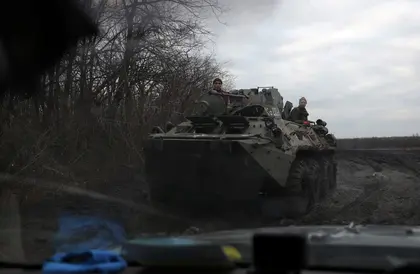The fate of the city of Bakhmut hangs in the balance this weekend, with Russian forces continuing to make gains and Ukraine blowing bridges in what analysts say is sign of possible preparations for a “controlled fighting withdrawal.”
The British Ministry of Defence (MoD) said the Kremlin’s regular army alongside the mercenary Wagner Group forces had made “further advances into the northern suburbs of the city”, meaning the area of the city still held by Ukrainian forces is “vulnerable to Russian attacks on three sides”.
- Find the latest Ukraine news published as of today.
- View the most up-to-date Ukraine news articles published today.
JOIN US ON TELEGRAM
Follow our coverage of the war on the @Kyivpost_official.
It added: “Ukraine is reinforcing the area with elite units, and within the last 36 hours two key bridges in Bakhmut have been destroyed, including a vital bridge connecting the city to the last main supply route from Bakhmut to the city of Chasiv Yar.
“Ukrainian-held resupply routes out of the town are increasingly limited.”
The Washington-based Institute for the Study of War concurred with the MoD assessment of the blown bridges, saying: “Ukrainian forces appear to be setting conditions for a controlled fighting withdrawal from parts of Bakhmut.
“The preemptive destruction of bridges is likely an indicator that Ukrainian troops may seek to inhibit Russian movement in eastern Bakhmut and limit potential westward Russian egress routes out of Bakhmut.”
British journalist Paul Conroy, who has recently returned from Bakhmut, told Kyiv Post “Bakmuht can’t hold on much longer”, but added: “With the caveat that we’ve heard that before.”

Russians Repurpose Old Underground Submarine Base in Crimea for Military Use
On Friday, the head of Russian mercenary group Wagner, Yevgeny Prigozhin, said Friday the group had “practically encircled” Bakhmut, adding “only one road remains” to be captured.
Speaking to Espreso TV on Friday, commander of a Ukrainian army unit in the city, Denys Yaroslavskyi, said that parts of some units had been ordered to rotate to more secured positions.
He described the current the situation since the morning as “a slaughterhouse on both sides.”
The battle for Bakhmut has become the longest and bloodiest since Russia’s full-scale invasion of Ukraine in February of last year and any potential Russian victory has come at an unimaginable cost.
Speaking earlier this week, Olexiy Danilov, National Security and Defense Council Secretary, said that in Bakhmut, Russian troops are losing seven times more soldiers than the Ukrainian forces.
"Yes, the situation there is difficult, but keep in mind that every day our men and women dispatch hundreds [of Russian soldiers] where they belong, given that they came here to kill us.
“Now we are killing them.”
Bakhmut, a small industrial city in eastern Ukraine known for its salt mines, used to be home to some 70,000 inhabitants before troops sent by President Vladimir Putin invaded the country on February 24 last year.
Months of artillery fire largely reduced the city to rubble and forced most of its residents to flee. Those remaining were forced to hide in basements, only venturing out for essential food and fuel, AFP reports.
On the frontline, Moscow and the Wagner mercenary group sent wave after wave of ill-prepared recruits to their death, Ukrainian soldiers say, describing them as "cannon fodder".
Many soldiers are also believed to have died on the Ukrainian side.
Western sources estimate that hundreds each day were wounded or lost their lives. The violence moreover caused casualties among the few thousand civilians remaining in the city, and the Ukrainian and foreign volunteers risked their lives to help them.
But the city is of little to no strategic importance, analysts say. Ukraine's President Volodymyr Zelensky said so himself in an interview with French newspaper Le Figaro published in early February.
"Strategically, Bakhmut is of little importance as the Russians have entirely destroyed the city with their artillery," he said.
Retired Australian major general Mick Ryan, of the US-based Center for Strategic and International Studies, said Bakhmut was "not an inherently valuable military target".
"The battle of Bakhmut... has absorbed massive military and human resources," he said.
"This investment is out of all proportion to the importance of the city." Belgian military analyst Joseph Henrotin said the city had become a fixation for both sides, but had only served to "mutually degrade their potential".
"Since December, the Russians have been trying to whittle down Ukrainian capacity by forcing them to deploy forces all over the place and preventing them from concentrating in one area to enable a breakthrough," he said.
But "Bakhmut is just one piece of the puzzle. Its fall will mean nothing if other positions hold".
Its capture could possibly allow the Russians to try to advance westwards towards Kramatorsk, but that city was well defended, he added.
You can also highlight the text and press Ctrl + Enter










